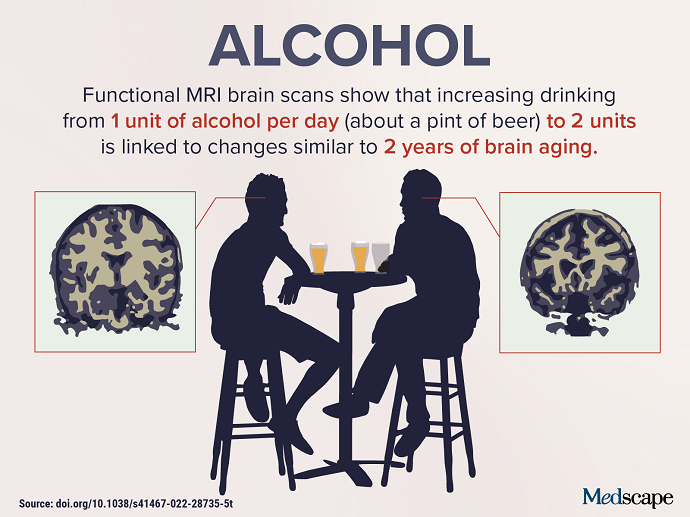Northerner
Admin (Retired)
- Relationship to Diabetes
- Type 1
Little more than a month after the World Heart Federation issued a policy brief that declared no amount of alcohol can be considered safe for the heart, new studies addressing alcohol's effect on the brain, cancer risk, and amyotrophic lateral sclerosis (ALS) incidence resulted in this week's top trending clinical topic. A new study out of the United Kingdom suggests that even a single drink per day is linked to detectable changes in the brain (see Infographic).

Researchers examined functional MRI brain scans from 36,678 healthy adults aged 40-69 years and compared findings with participants' weekly alcohol consumption, adjusting for confounders (eg, age, sex, height, socioeconomic status, country of residence). The study found negative relationships between alcohol intake and global gray- and white-matter measures, regional gray-matter volume, and white-matter microstructure indices. These associations were widespread across the brain, and the magnitude increased with the average absolute number of daily alcohol units consumed by participants.

 reference.medscape.com
reference.medscape.com

Researchers examined functional MRI brain scans from 36,678 healthy adults aged 40-69 years and compared findings with participants' weekly alcohol consumption, adjusting for confounders (eg, age, sex, height, socioeconomic status, country of residence). The study found negative relationships between alcohol intake and global gray- and white-matter measures, regional gray-matter volume, and white-matter microstructure indices. These associations were widespread across the brain, and the magnitude increased with the average absolute number of daily alcohol units consumed by participants.

Trending Clinical Topic: Alcohol
Studies on the negative health effects of alcohol consumption once more became the top clinical story, with findings involving cancer, brain changes, and amyotrophic lateral sclerosis.
